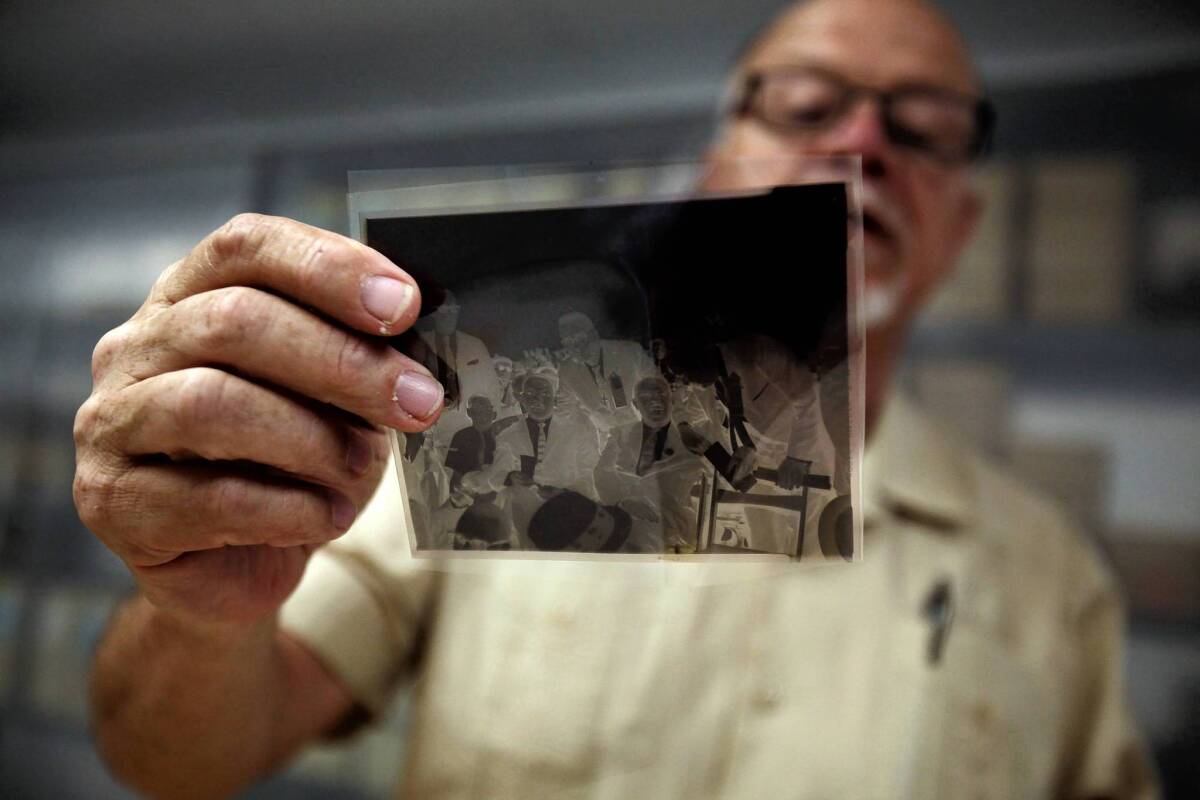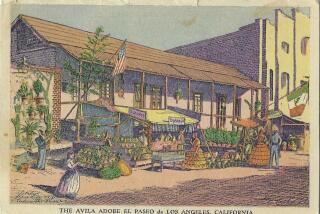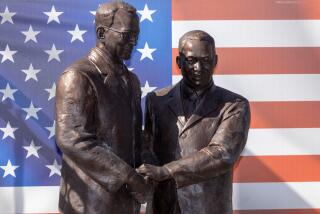At Cal State Northridge, a photographic window on postwar black L.A.

They captured a postwar Los Angeles of dignified church ladies and fancy society balls, of “Sugar” Ray Robinson at an Ojai training camp and Black Panthers at City Hall.
Photographers Harry Adams, Charles Williams and Guy Crowder documented the city in the midst of social, political and cultural change as experienced by African American men and women whose lives were rarely reflected in the wider media.
Many of those images are housed in the African American Photography Collection at Cal State Northridge’s Institute for Arts & Media. A new project will soon make them available to the public.
The university recently received a $290,000 grant from the National Endowment for the Humanities to create a digital database of nearly 20,000 photographs and negatives from the vast Adams, Crowder and Williams collections, which will be available online to researchers, educators and others through the campus’ Oviatt Library.
The project is expected to take nearly three years and will create an archive that can be searched by the names and events that shaped the landscape of contemporary Los Angeles.
“The grant allows us to make these photographs accessible to the public in a much more usable and convenient way,” said journalism professor R. Kent Kirkton, director of the Institute for Arts & Media. “The subjects and events are such an important part of local history but are not so well known outside of the black community. Hopefully, this will help broaden the understanding of Los Angeles and the accomplishments of black L.A.”
Adams, Crowder and Williams worked largely as freelancers for such black publications as the Los Angeles Sentinel and California Eagle and were positioned to capture the newsmakers of the day — politicians, entertainers, athletes — as well as everyday life in churches, garages, cocktail lounges and schools.
Adams and Williams survived into the 1980s, and Crowder died in 2011. The span of their work reflected the postwar hopes of black immigrants from the South, the civil rights activism and riots of the 1960s and beyond.
A series of photographs by Adams chronicles a 1963 visit to Los Angeles by the Rev. Martin Luther King Jr. that included nearly 40,000 people attending what was the largest civil rights rally held in the city.
In one photo, King, draped in clergy robes, stands behind a pulpit before a rapt congregation in an overflowing church. In another, King and Ralph Abernathy are flanked by equally attentive Paul Newman, Sammy Davis Jr., Marlon Brando and other Hollywood stars.
Williams photographed a lavish production scene of the Avanelle Harris Dancers at the Million Dollar Club in 1943 and a view of the vibrant street life in 1945 on Central Avenue near the Dunbar Hotel, then a hub of black entertainment and culture.
A 1969 photo by Crowder depicts the aftermath of a shootout with police in front of the Black Panthers headquarters at 41st and Central Avenue. Glass and furniture are strewn on the sidewalk and pedestrians walk through a phalanx of armed officers.
Crowder loved all subjects, said his wife, Pat.
“He would come home and I would just listen to all of the stories he had to tell me about Bishop [Desmond] Tutu and Sammy Davis Jr., who was his favorite and gave him a slot machine that I still have to this day,” she said. “He would be very proud to know that his works haven’t gone down in vain and will be there for students and everyone to share.”
Part of the grant will allow the university to hire several archival assistants to help identify subjects in some of the photos and to flesh out their historical context.
Keith Rice received a master’s degree in history from Northridge and is already doing detective work, including contacting friends and associates from his days in the music business years ago.
“We’ll be looking at dates, people and the context of events,” Rice said. “Sometimes there is a group of people you otherwise might not see together such as Redd Foxx, Coretta Scott King and Michael Jackson when he was 12 years old. That’s what amazes me about the collections. These are behind the scenes, people being regular people and not iconic figures.”
The project will include an education package that schools can use as part of history lessons, Kirkton said.
“We can structure a curriculum to let people know that change comes from the bottom up and means struggle and hard work,” Kirkton said. “We celebrate many of these people as heroes, but we need to look a little deeper at how they became heroes and sacrificed to make gains.”
More to Read
Start your day right
Sign up for Essential California for news, features and recommendations from the L.A. Times and beyond in your inbox six days a week.
You may occasionally receive promotional content from the Los Angeles Times.







